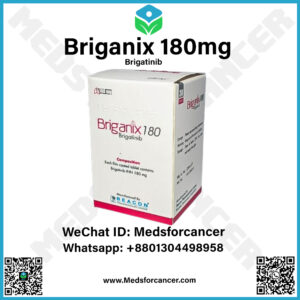Lorbrexen 100mg (lorlatinib) Tablet
Product Name: Lorbrexen
Brand Name: Lorbrena
Generic Name: Loraltinib
Quantity: 30 Tablets
WeChat:
Lorbrexen 100mg (lorlatinib) Tablet is an anti cancer agent used in the treatment of non-small cell lung cancer with anaplastic lymphoma kinase gene. Doctor may perform a test to identify if there any ALK gene in your cancerous tumor. This medicine is available only under registered doctor’s prescription. It is used in adults patients who have been diagnosed with ALK positive non-small cell lung cancer.
Each lorbrexen 100 mg contains 100 mg lorlatinib. Everest pharmaceutical has manufactured this medicine as a generic medicine under the FDA approval.
How does lorlatinib work?
Lorlatinib is a anti cancer drug in the class of kinase inhibitor. It works by interfaring in the growth of new cancer cells and cells division so that tumor does not spread other parts of the body. In this way lorlatinib help human body to shrink the tumor and destroy it gradually. Lorlatinib only works in treating ALK positive non-small lung cancer. FDA has approved this medicin to treat only this type of lung cancer. But with more research work and field experiment doctors may use this medicine to treat other disease also.
What is the dosage and administrtion?
Dosage and administration can be different according to patietns physical condition. But the general dose is same for everyone. To know the dosage prescription ask your doctor. Do not decide your dose reading any content in the internet. Because your doctor will make your prescription after exemining your disease.
- The general dose is 100 mg lorlatinib every day at the noon after having meal.
The administrations are below, read carefully before taking the medicine.
- Do not break or chew the tablets, swallow it with a full glass of water.
- Be careful about missed dose and overdose. Do not adjust your dose without doctor’s permission.
- Take the medicine with or without food as your doctor prescribed.
Side Effects of Lorlatinib
There are common and serious side effects of lorlatinib and seriousness of side effects also depend on patient’s health condition. How their bodies response to the medicine. Lets have a look on some side effects of lorlatinib, about which patients should concern.
Serious side effects of lorbrexen 100 mg
- Lorlatinib can cause liver problem if the chemical substance in the lorbrexen attacks the livers.
- It also can affect the central nervous system that may seems loss of memory, change of mood and other problems related to the nerves.
- Lorlatinib can increase the cholesterol and suger level in the blood, it can be lethal for those patients who are already suffering from blood suger and cholesterol.
- It may cause serious heart problem like heart failure and heart attack.
- High blood pressure.
- Lungs problem.
- Kidney problems.
- High blood sugar.
Consider before taking lorlatinib if you already have
- Kidney problems
- Depression or anxieties
- High level of cholesterol
- Problem of heartbeat.
- Breathing problems.
- Diabetic
Lorbrexen 100 mg Price in Bangladesh
Lorlatinib 100 mg price varies brand to brand. This is a very costly medicine and not affordable for every one but Everest pharmaceutical is offering Lorbrexen 100 mg which is the generic of lorlatinib is much affordable compared to other medicine. Lorbrexen 100 mg only costs $450. The price is variable and can be changed at any time.











